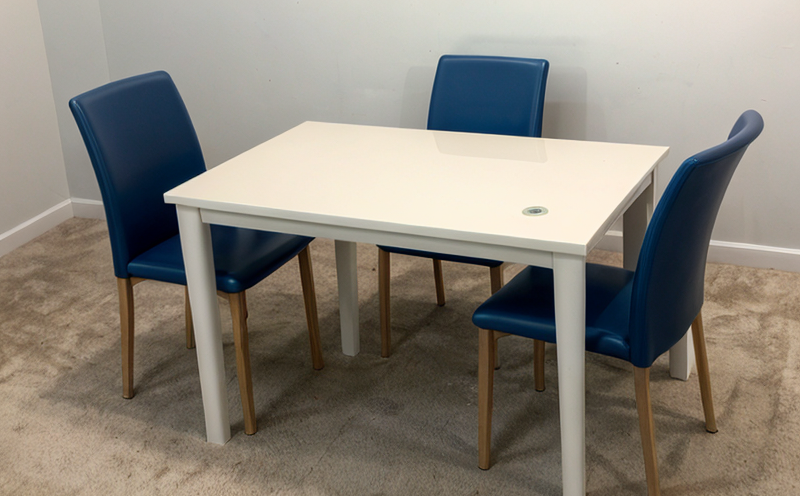UL 746B Long Term Heat Aging Testing of Furniture Plastics
The UL 746B standard is a crucial part of quality assurance and compliance in the furniture industry. This testing ensures that plastics used in furniture withstand long-term exposure to heat without losing their structural integrity or compromising safety. The test simulates real-world conditions, providing valuable insights into how materials will perform over extended periods under elevated temperatures.
The UL 746B standard is particularly relevant for polyurethane foam and other plastic components that are integral to furniture design. It involves subjecting specimens to a prescribed temperature and time cycle in an oven environment. The test aims to assess the material's resistance to thermal degradation, which can affect both its mechanical properties (like tensile strength) and appearance (such as color change or brittleness).
For materials to pass this stringent test, they must maintain their dimensional stability and not exhibit excessive discoloration, cracking, or other signs of deterioration. The testing process helps manufacturers ensure that the plastics used in furniture meet safety standards and are reliable over time.
The significance of UL 746B extends beyond compliance; it also serves as a benchmark for quality control. By adhering to this standard, manufacturers can enhance product longevity and consumer satisfaction. This is especially important given the growing demand for sustainable and durable home furnishings that withstand environmental stressors like heat without compromising comfort or aesthetics.
Understanding the parameters of UL 746B testing involves recognizing its key aspects:
- Temperature Exposure: Specimens are exposed to a high temperature (typically between 130°F and 158°F) for an extended period, simulating real-world conditions over time.
- Time Cycle: The duration can vary depending on the specific requirements but is generally designed to simulate many years of use in a controlled environment.
- Specimen Preparation: Specimens are cut from finished products or prototypes, ensuring they represent actual materials used in furniture construction.
The test results provide critical data for R&D engineers and quality managers. They can identify potential issues early in the development process, allowing for adjustments before full-scale production begins. This proactive approach not only ensures compliance but also enhances brand reputation by delivering high-quality, reliable products.
Compliance with UL 746B is essential for manufacturers aiming to meet regulatory requirements and gain competitive advantage in a global market. It demonstrates a commitment to quality and safety, which can be a significant factor in customer trust and satisfaction.
Benefits
The UL 746B Long Term Heat Aging Testing offers several key benefits:
- Enhanced Product Quality: By identifying material weaknesses early, manufacturers can improve product durability and performance.
- Regulatory Compliance: Ensuring compliance with international standards like UL 746B helps avoid legal issues and ensures products are safe for consumer use.
- Increased Marketability: Meeting these standards can enhance the reputation of manufacturers, leading to greater market acceptance and higher sales.
- Risk Management: Early detection of potential problems minimizes the risk of product recalls or safety issues, reducing costs associated with failures.
In addition to these benefits, UL 746B testing also supports sustainable practices by encouraging the use of materials that are more resistant to environmental stressors. This aligns with broader industry trends towards eco-friendly and long-lasting products.
Customer Impact and Satisfaction
The results of UL 746B testing directly impact customer satisfaction by ensuring the longevity and safety of furniture products. Consumers appreciate durable, safe, and aesthetically pleasing furniture that can withstand various environmental conditions without compromising comfort or appearance.
- Longevity: Products that pass this test are expected to last longer, reducing the need for frequent replacements and repairs.
- Safety: Compliance with UL 746B ensures that materials used in furniture do not release harmful substances or undergo structural changes that could pose risks to users.
- Aesthetics: The test helps maintain consistent color, texture, and appearance of the material over time, ensuring a high-quality aesthetic experience for customers.
For businesses, this translates into higher customer satisfaction, which can lead to repeat business and positive word-of-mouth. Satisfied customers are more likely to recommend products to others, fostering brand loyalty and growth.
Competitive Advantage and Market Impact
The UL 746B Long Term Heat Aging Testing provides a competitive edge by demonstrating a commitment to quality and safety. This can be particularly advantageous in markets where regulatory compliance is stringent or where consumers are increasingly demanding eco-friendly and sustainable products.
- Regulatory Compliance: Meeting this standard ensures that manufacturers stay ahead of changing regulations, which can give them an edge over competitors who may not prioritize such testing.
- Sustainability: Demonstrating the ability to use materials resistant to heat aging aligns with growing consumer preferences for sustainable products. This can attract environmentally conscious buyers and enhance brand image.
- Consumer Confidence: Products that pass UL 746B are more likely to gain trust from consumers, leading to increased sales and market share.
The test also supports innovation by encouraging manufacturers to explore new materials and techniques that can withstand long-term heat exposure. This ongoing research and development enhance the overall quality of products in the furniture industry, driving technological advancements and maintaining a competitive edge.





